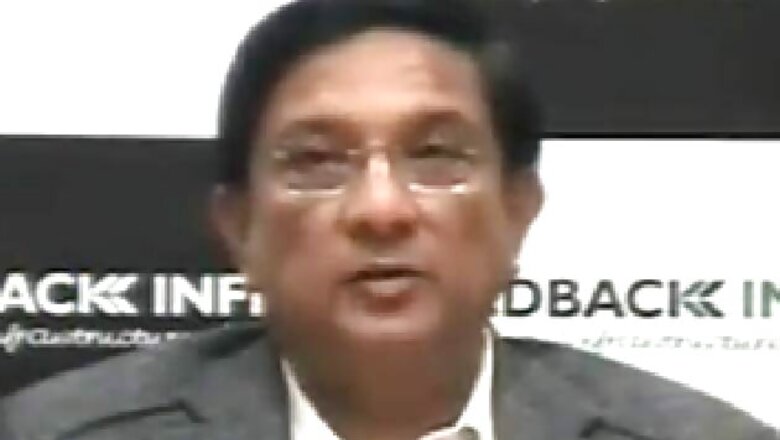
views
Vinayak Chatterjee, chairman, Feedback Infrastructure says the infrastructure sector is expected to be government's priority in this Budget and the key expectation is the removal of the infrastructure sector from the ambit of MAT. "The government must increase the limit on tax-free bonds for retail investors and build infrastructure funds from PSU cash reserves," he told CNBC-TV18.
Chatterjee adds that there was an urgent need for long-term schemes to pump liquidity into state electricity boards the establishing of a national infrastructure annuity fund to enhance private participation. He calls for a five-year extension of the sunset clause for the power sector.
Below is the edited transcript of the interview on CNBC-TV18
Q: Aside of general expectations that the Budget will do something for the sector, do you see anything specific which might unlock the frozen investment cycle?
A: We have actually got a bunch of expectations. First, on the top of the agenda is to remove Minimum Alternative Tax (MAT) from the infrastructure sector, because you got a 10 year holiday. So to first announce a 10 year tax holiday and then say pay MAT seems to be self-defeating.
Agenda item number two relates to infrastructure bonds. One expectation is that for retail investors the limit for exemption on income tax will be raised from Rs 20,000-50,000, because you are at the stage when you really want to mobilize long-term debt for infrastructure.
You have tax-free status for public sector undertakings (PSU) bonds, and in the 12th Plan, you expect 50 per cent investment from private sources. Why should this exemption only be for public sector? Why not have a tax holiday for private sector floating infrastructure bonds also? These are the two expectations on infra bonds.
Then there is the longstanding issue of exempting Special Purpose Vehicles (SPV) from Dividend Distribution Tax (DDT) because it really does not make sense to tax them at the level of the SPV that has been around for a long time.
There is an expectation that integrated township development be accorded infrastructure status largely because there are many private players doing fairly large new townships as well as the Delhi-Mumbai Industrial Corridor (DMIC) projects like Dholera, Neemrana etc. These are large new townships which are required for urbanisation.
There is an issue of cash reserves of PSUs. Today our assessment is that the public sector infra companies are sitting on a cash pile of about Rs 2.5 lakh crore. For example, Coal India itself has a cash pile of Rs 60,000 crore. There are certain segments of investors who are demanding 100 per cent dividends etc. I think the FM should announce some kind of an overarching scheme where this large cash pile, Rs 2.5 lakh crore can easily become Rs 3 lakh crore. It is a huge amount of liquidity available outside the Budget for investing in the much needed backbone of India like rail links, ports, new roads etc.
So why is this liquidity being allowed to lie idle in the balance sheets of PSUs? I think the FM should give a strong message to PSUs that they should come up with investment plans and if they do not then there should be some mechanism where the liquidity is transferred without any adverse impact to the financials of the PSU into some kind of a national infrastructure development fund so that there is a larger picture of how to utilise your and my money in these PSUs for nation-building.
Finally, there is a serious issue of the ability of state governments to take over 50 or 60 per cent portion of the restructuring of the state distribution companies (discoms). We are increasingly hearing voices from the states which say that the center must announce some kind of a credit enhancement package in discussion with World Bank, Asian Development Bank (ADB) or India Infrastructure Finance Company (IIFCL). Some degree of sovereign guarantee or any other credit guarantee mechanism will allow the states headroom to honour their commitment to pick up 50 per cent of the restructured assets of discoms. The Centre must take a stance there. It cannot just announce a scheme and leave it to the state governments to do their own number, because we know how fiscally weak the balance sheets of the state governments are.
The other expectation is a long-term scheme to pump liquidity back to discoms from what are called regulatory assets. This is a complex subject where the electricity regulator does not accord a tariff increase, but recognizes the need to compensate the electricity supplier and therefore creates a bunch of assets called regulatory assets which remain on the balance sheet, but are not cash in the hand of discoms. This requires, like the discom restructuring, pumping liquidity back from a balance sheet item called regulatory assets into the hands of discoms to give them more liquidity.
There are fears that infrastructure budgets maybe cut along with cuts across many other expenditure heads to keep the fiscal deficit at 5.2-5.3 per cent. I would not be so worried about cutting the budgets of various infrastructure schemes. But my suggestion is that even in public expenditure like Pradhan Mantri Gram Sadak Yojana or Rajiv Awas Yojana, there are a lot of public expenditure schemes in infra space where the private sector can be involved.
Q: The power sector topped the Prime Minister's and the finance minister's agenda over the past few months. Do you expect any relief to be provided to the sector?
A: The big expectation for the power sector is extension of the income-tax holiday where the sunset clause comes into effect on March 31. This is followed by demand for exemptions related to customs duty and income tax.
Q: Do you expect FM to resolve and smoothen the relationship between the National Highway Authority of India (NHAI) and private companies in the Budget?
A: This is really outside the purview of the Budget. Industry has demanded for more active participation from the NHAI in helping resolve the logjam.
Q: You called for the need to raise the cap on infrastructure funds from Rs 20,000 to Rs 50,000. How much money was raised last year via this route?
A: I think the finance minister needs to do something to boost the infrastructure bond market because commercial banks create infrastructure debt funds to address the asset-liability mismatch and they are going to be of no use unless there is sufficient interest in the investing community to subscribe to these funds.




















Comments
0 comment